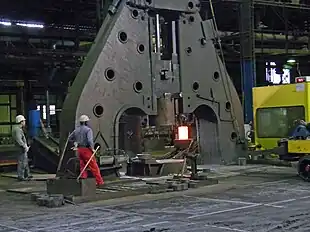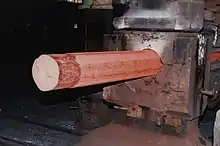Forging
Forging is a way of making things. It involves changing the shape of metal by using compressive forces. These forces are normally supplied by hitting the metal with a hammer or a die. There are different types of Forging based on the temperature at which the forging is done. These include cold forging, warm forging, and hot forging. For warm and hot forging, the metal is heated. This is usually done in a forge. Things can be forged in many different sizes. They can range in weight from less than a kilogram to hundreds of metric tons.[1][2] Forging has been done by smiths for a very long time. Common products made by forging include kitchenware, hardware, hand tools and weapons such as swords and axes.


Since the Industrial Revolution, forged parts are widely used in machines. They are used in machine when a part that has a high strength is needed,
History
Forging is one of the oldest metalworking processes.[1] It was normally done by a smith using hammer and anvil. People started using water power in the 12th century. They also started working with iron at that time. Using water power allowed them to use bigger and more powerful hammers. This allowed the smiths to increased the amount and size of iron that could be forged. The forge has changed over centuries. It has become a place with engineered processes and equipment to handle the needs of modern industry.
In modern times, forging is often done with presses or with hammers powered by compressed air, electricity, hydraulics or steam. These hammers can weigh thousands of pounds.
References
- Degarmo, p. 389
- Heavy Manufacturing of Power Plants Archived 2010-11-08 at the Wayback Machine World Nuclear Association, September 2010. Retrieved: 25 September 2010.
Sources
- Degarmo, E. Paul; Black, J. T.; Kohser, Ronald A. (2011). Materials and Processes in Manufacturing (11th ed.). Wiley. ISBN 978-0-470-92467-9.